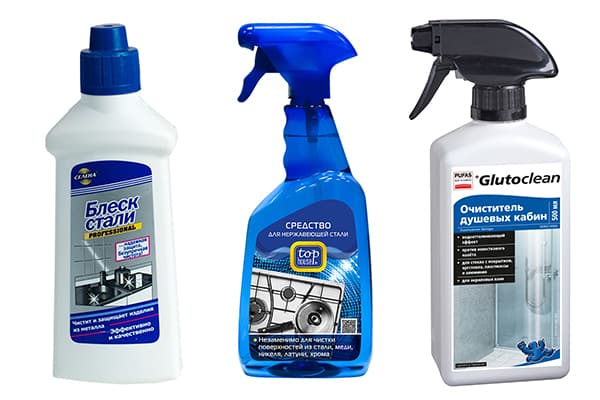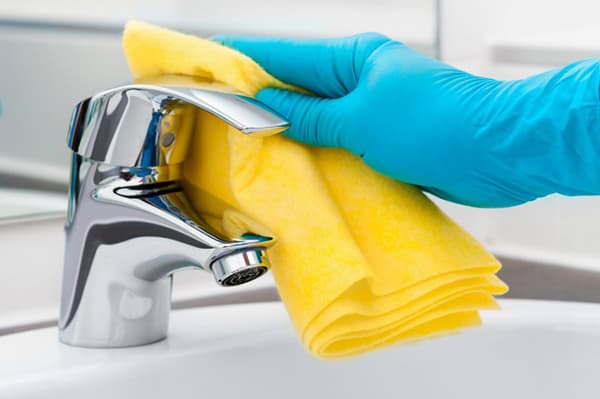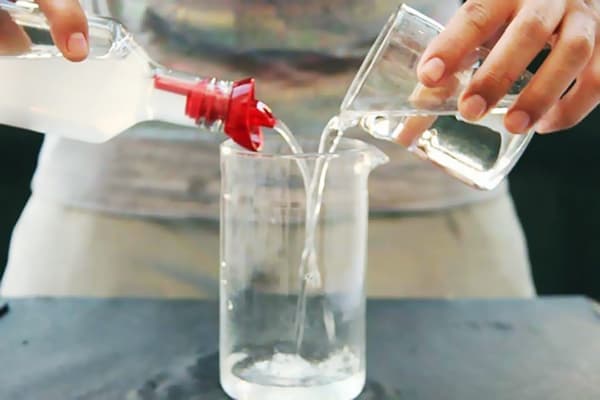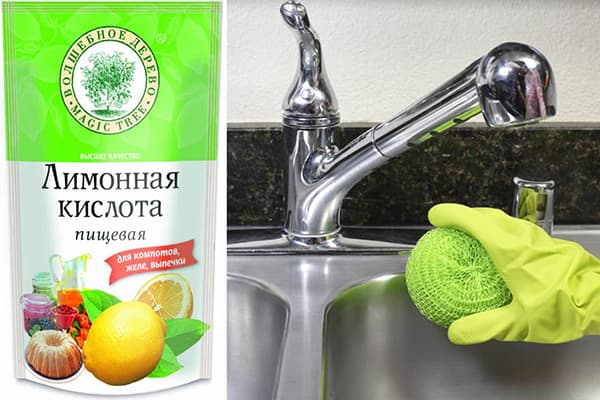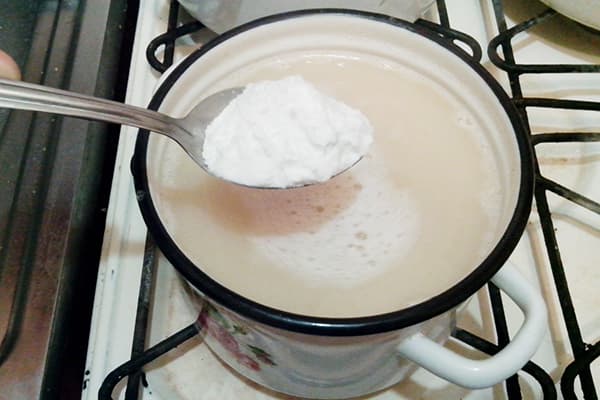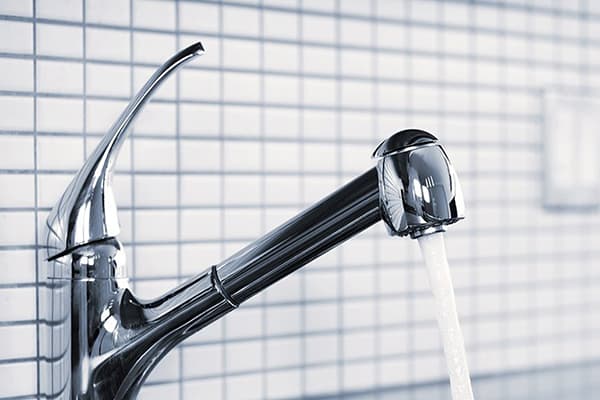We wash the faucet and plumbing fixtures from lime deposits
The reason for the appearance of white sediment on the shiny metal surface of a sink, faucet or mixer is the high content of iron, magnesium and calcium salts in tap water. Cleaning the faucet from plaque will not be difficult. To do this, you can use industrial chemicals or ordinary products that can be found in any housewife’s kitchen.
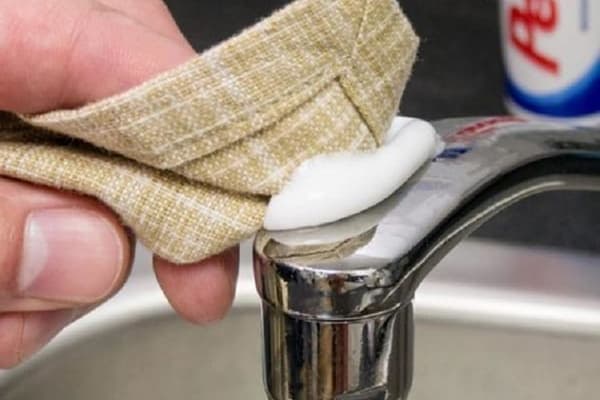
Industrial chemistry for salt deposits on taps
Today, in the era of new technologies, many housewives prefer to clean their kitchens not in the “old-fashioned” way, but with special compounds that are sold in any household chemicals store.
If you decide to clean the faucet from limescale using industrial products, it is important to adhere to the following recommendations:
- Taps and mixers can be made of different metals and have different finishes. Those substances that perfectly clean aluminum are not suitable for chromium. Therefore, when selecting cleaning chemicals, it is necessary to take into account the composition of the material from which the product is made.
- Do not use anti-rust agents or bleaches on chrome parts. Otherwise, the faucet will become covered with dull spots that will be impossible to remove.
- The chemical cleaner should not contain chlorine, hydrochloric or phosphoric acid.
- It is better to use liquid or gel chemicals. The powder leaves cracks and scratches.
- Do not clean the faucet with a knife or iron sponge.This can damage the metal surface.
- You should not mix several products, because the result in this case is unpredictable.
All work on cleaning plumbing at home using chemicals must be carried out wearing protective gloves.
Next, we will name several industrial compounds that are recognized by customers as the best remedy in the fight against salt deposits.
- TOP HOUSE
This product is used to clean stainless steel. The chemical is produced in Germany and costs 460 rubles. TOP HOUSE does an excellent job of removing deposits on sinks, taps and mixers. They can be used to clean cutlery, dishes and other items made of stainless steel. The product is available in aerosol form. The method of application is intuitive: you just need to open the sprayer shutter and apply the liquid to the surface that requires cleaning. After 5-10 minutes, all you have to do is wipe the tap with a damp cloth - and the plaque will be gone.
- "Selena Shine of Steel"
A cleaning product from the Russian manufacturer Selena will remove lime deposits from any metal surface, except polished aluminum. The budget price (43 rubles for 250 ml) combined with high efficiency has made “Selena” a favorite of many housewives. The suspension is applied to a sponge and wiped over the contaminated area, after which the traces are washed off with water.
- Pufas Glutoclean
The gel-like cleaner will quickly remove limescale, white stains from soap and gel, and easily deal with salt deposits, gray deposits and rust. The impressive cost of this product (700 rubles) is justified by the cost-effectiveness and effectiveness of the gel. Due to its dense structure, the product does not spread for a long time and manages to dissolve the smallest particles of dirt.With Pufas Glutoclean, a fresh smell in the kitchen and a radiant shine to your plumbing are guaranteed.
In addition to the cleaning products discussed, Sanox, Cif, Electrolux stainless steel cleaner spray, NEOBLANK, Ravak Cleaner Chrome and others will cope with the problem.
To keep taps sparkling clean longer, after general cleaning they are rubbed with polishes, as a result of which a protective waterproof film is formed on the metal surface. Here are a few effective remedies that have proven themselves only on the good side:
- Wpro 29945,
- Domax,
- Indesit,
- HG Steel Polish.
We wash with improvised means
If there is no suitable cleaning composition in the house, it would be useful to remember folk remedies. Vinegar, soda, and laundry soap will come in handy.
Vinegar solution
Acetic acid can easily deal with even old lime deposits. There are two ways to use this substance to clean plumbing:
- Table vinegar (9%) is mixed with water in a 1:1 ratio. Using a sponge soaked in the prepared solution, treat the area of contamination and after 5-10 minutes wash off with clean water.
- Vinegar is mixed with water in a 1:1 ratio and heated slightly. Soak a napkin in warm acetic acid and wrap it around the tap. After half an hour, you can remove the napkin and rinse the area with water.
If unscrewing the tap is not difficult, it is better to immerse it entirely in a vessel with a solution of acetic acid for 8-10 hours. After this, all that remains is to rinse the part under running water - and all salt deposits will disappear without a trace.
Lemon acid
By dissolving citric acid powder in water, you can get an inexpensive but very effective means for cleaning metal surfaces. To prepare the solution 4 tbsp. l.powder is combined with 1 liter of water. Saturate a sponge or piece of cotton cloth with the resulting mixture and treat the contaminated areas. If the desired cleanliness is not achieved the first time, the procedure should be repeated.
Removable parts can be immersed in a citric acid solution overnight. In a few hours, the solution will certainly cope with the most serious deposits. All that remains is to rinse the product with clean water and polish with a cloth.
Laundry soap and soda
Baking soda in combination with laundry soap is an indispensable assistant to the housewife in the fight against lime deposits. Use these tools as follows:
- A bar of laundry soap is grated on a coarse grater and dissolved in 200 ml of hot water.
- Add 2-3 tbsp to the resulting solution. l. baking soda.
- The contaminated surface is treated with a sponge soaked in a cleaning agent or a toothbrush.
- The tap is washed with clean water and wiped dry.
To polish the cleaned faucet until it shines, use microfiber cloths. They will easily erase drops, streaks and smudges remaining from dried water.
How to prevent plaque from appearing?
If hard water is supplied to your home, a white coating will always appear on your plumbing fixtures. The main thing is not to let the situation get worse and not wait until the limestone has to be peeled off from the surface of the sink or faucet mechanically.
Here are some tips to help prevent salt deposits from forming on your plumbing:
- Every evening after cleaning the kitchen, the faucet and sink should be wiped dry with a microfiber cloth.
- Treat shiny parts once a week with wax shampoo or polishes designed for this purpose.
- You can use glass cleaner to clean metal surfaces.
If you have a reliable cleaning product on hand that can remove limescale from the metal surfaces of taps and mixers in a matter of minutes, the problem of hard water can be dealt with without much difficulty. Do not forget about folk methods that involve the use of improvised means.
